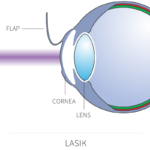
What Is LASIK Eye Surgery?
In order to improve or completely eliminate the need for glasses or to wear contact lenses, LASIK eye surgery makes use of laser technology. People with vision problems who have spent their entire lives needing corrective lenses often look forward to the potential of laser suite as a way to improve their vision beyond what can be accomplished with corrective lenses. Nearsightedness, farsightedness, and astigmatism are all treatable with LASIK eye surgery.

The term “LASIK” refers to a specific brand of an increasingly popular type of laser eye treatment. Refractive surgery is the medical word. A laser is used in refractive surgery to create a microscopic incision in the corneal tissue of the eye, and the laser is then used to reshape the eye to correct the patient’s eyesight.
Although most eye surgeries with LASIK are successful and have no negative consequences, there is always a chance that anything could go wrong after LASIK surgery. Obviously, it could create serious vision issues if it is not conducted properly or if it is performed on people who should not have it.
When it comes to the eyes, is LASIK eye surgery governed by law?
The FDA controls the marketing, distribution, and use of all medical equipment, including LASIK lasers. However, the FDA cannot strictly control a doctor’s practise, even if it includes the use of LASIK eye surgical equipment. The Food and Drug Administration does not oversee any eye surgery, including LASIK.
When it comes to the SMSF setup process, it’s essential to understand that the FDA’s oversight is not directly involved. Although the FDA has regulatory authority over medical equipment, including LASIK lasers, it does not extend to overseeing eye surgery procedures like LASIK. Therefore, individuals embarking on the SMSF setup process should focus on complying with the relevant financial and legal requirements rather than seeking FDA approval or oversight.
The FDA, for instance, does NOT have the power to:
- Limit the amount a surgeon can charge for LASIK procedures;
- Insist that doctors tell patients specific things before performing LASIK;
- Make a surgeon provide a patient a brochure written by the maker of their LASIK equipment;
- Make a system for ranking medical devices that must comply with FDA guidelines.
While doctors should always do what’s in the best interest of their patients, they have some leeway in deciding whether or not to recommend eye surgery using LASIK.
The majority of LASIK cases accuse doctors of improperly performing the operation. Malpractice in LASIK eye surgery frequently involves a surgeon who operated on a patient despite clear evidence that they were not a good candidate for the procedure due to their health.
Dangers of Having LASIK Eye Surgery Done?
Complications and adverse effects are reported by a sizable percentage of patients following LASIK eye surgery. Dry eyes, described variously as a “gritty” or “sand-like” sensation when blinking, are by far the most frequently reported adverse effect. Some people’ cases of dry eye may be short-lived, while others’ cases may be more chronic.
Other documented side effects of LASIK surgery include:
- Disturbances to or complete loss of vision
- Sensitivity to light
- excess or deficiency in corrective lenses
- Effects similar to halos or starbursts around lights seen at night
- Experiencing discomfort because of the operation
- blood loss
- Astigmatism and similar induced eye disorders.

If a doctor or surgeon injures a patient by deviating too far from the accepted norm of care, the patient may have a case for medical malpractice. If performed properly on a healthy individual, the LASIK eye surgery should not result in any harm.
One of the major dangers of eye surgery with LASIK, however, is that doctors may miss underlying health issues in patients that would make the procedure too risky to perform. In addition, there is always the possibility that the surgeon will make a mistake during the operation.
Patients with keratoconus, a condition in which the cornea, the clear front section of the eye, bulges outward in a cone shape, are typically not good candidates for LASIK eye surgery. The success of LASIK surgery can be compromised by a variety of additional corneal abnormalities.
Preoperative screening for these corneal abnormalities is one of the most prevalent areas where LASIK eye physicians go wrong. It would be negligent to perform LASIK surgery on persons who have these conditions.
A qualified medical malpractice attorney is a good resource for anyone experiencing any of the problems mentioned above following LASIK eye surgery or treatment. A lawyer can help find a doctor who can provide an honest assessment of whether or not their client has been the victim of malpractice.
What really matters is that a person who has been hurt after undergoing LASIK surgery may be able to file a legal action claiming medical malpractice and receive compensation for their losses.
When LASIK Eye Surgery Goes Wrong, What Can I Expect?
Individuals who feel they were harmed in any way during their LASIK eye surgery procedure may choose to pursue legal action against the facility or surgeon. To establish medical malpractice, one must typically show that the treating physician failed in his or her responsibility to care for the patient and that this failure directly resulted in the patient’s harm.
A person who is thinking of suing over LASIK eye surgery should:
- Save any receipts, bills, and paperwork associated with their eye care and billing;
- Keep a journal or diary detailing your experience with LASIK from start to finish;
- Document their wounds in writing;
- Take notes on their pre-LASIK eye problems and why they ultimately decided to have the treatment done.
Finally, patients should exercise extreme caution while signing any documents at the medical provider’s office, including consent forms. Before receiving LASIK eye surgery, many patients are required to sign a waiver or permission document.
If you’re considering filing a lawsuit in connection with your LASIK surgery, it’s in your best interest to study these documents carefully. A patient should look elsewhere for medical care if he or she is requested to sign a document waiving the right to sue or go to court in the event of a dispute about the course of the laser eye treatment.
To what extent do I have the right to make a claim?
There must be proof of negligence for a claim of malpractice to be filed in a court of law involving LASIK eye surgery. Having a duty to exercise reasonable care, and then failing to do so, are the foundational pillars of negligence.
Medical professionals have a responsibility to provide their patients with the highest standard of care consistent with the severity of their illnesses. Patients have the right to sue medical professionals for malpractice if they feel they were negligently treated.
If a patient has complications following LASIK eye surgery, their attorney will likely have them see a specialist who can evaluate their condition and examine their medical records to determine whether or not the patient was the victim of medical negligence. After that, the doctor could testify in court as an expert witness and discuss the malpractice claim.
Many patients who have undergone LASIK eye surgery have reported experiencing the following adverse effects and symptoms:
- Vision impairment
- See double or blurred vision
- Having trouble seeing at night
- Pain that persists over time
- Under- or over-treatment
- Observing Rings of Color Around Lights
- Starbursts or glares
- Tear ducts that aren’t producing enough fluid
- The inability to differentiate between shades of colour or shades of depth
- Death by blindness
Some persons experience side effects that last a long time or are so noticeable that they make it difficult for them to carry out their regular activities and get the job done. Their corneas were permanently damaged, and they eventually had corneal transplants to regain their sight.
A malpractice case may be settled out of court before going to trial. The lawyers involved then share relevant material with one another and, with their respective clients’ permission, settle the case for a sum that the doctor agrees to pay. LASIK surgery malpractice lawsuits might result in LASIK surgery malpractice settlements as well.
Conclusion
Personal Eyes’ mission is to provide information to everyone interested in learning how to better their eyesight. And if you are seriously considering laser vision correction, you need first ensure that you are a suitable candidate.
If you are having any questions or inquiries about how to have a correct vision, Laser eye surgery procedure, Corneal tissue problems, Lasik surgery, a laser beam in the healing process, excimer laser usage, refractive error, laser treatment, glasses or contact lenses, blurred vision, contact sports, the surgical procedure for refractive surgery or Lasik laser eye surgery – you should get in touch with us via our Personal Eyes website to book your free assessment today.
.





